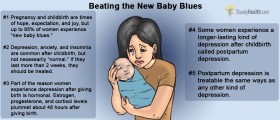
Tips To Help Manage Autistic Meltdowns In Children
Autistic meltdowns are frustrating and scaring for those who experience them as well as everyone around. What should parents of autistic children know about them?

Understanding Aggression And Destructive Behavior In Autism
Research shows that autistic people are more likely than others to become aggressive — but why? And is everything that looks aggressive really so?

Sleep Disorders And Autism: How Does ASD Affect Sleep?
Research suggests that autistic people are much more likely to suffer from dysfunctional sleep. Why, and what are some solutions?

Clinical Depression And Autism: When Autistic People Become Depressed
Depression is more common among people on the autism spectrum, but because it may present slightly differently, there's a risk of misdiagnosis or missed diagnosis. What do you need to know?

The Roots Of Postpartum Depression Run Deep
Pregnancy and childbirth usually bring feelings of joy and satisfaction. Sometimes these experiences activate post-traumatic stress, having lasting consequences for both mother and child.

Mood Episodes In Bipolar Disorder: Differences Between Manic, Hypomanic, And Depressive Episodes
It can be hard to differentiate between the main episodes of bipolar disorder, so this article will try to provide more information about each of the three — manic, hypomanic, and depressive episodes.

3 Ways Doctors Diagnose Bipolar Disorder
Maybe you've noticed something's off in your behavior and want to pay your physician a visit? There are a few common ways doctors determine whether someone has bipolar disorder and they include physical and lab tests, as well as a talk with a therapist.

Mood Episodes In Bipolar Disorder: What Is Typical For A Manic Episode?
Mania is often considered as the “euphoric” part of the bipolar spectrum, but sometimes it can really disrupt lives — even more so than depression. We have more on mania below.

3 Possible Causes Of Self-Harm In Autistic People And How To Deal With It
Autistic people may engage in self-injurious behaviors on purpose or accidentally. Here are some reasons why.

Wandering And Autism: Why Do Autistic Children Run Away?
Research shows that half of autistic children "wander off", leaving safe spaces, at least once after their fourth birthday. Why, and what can you do about it?

